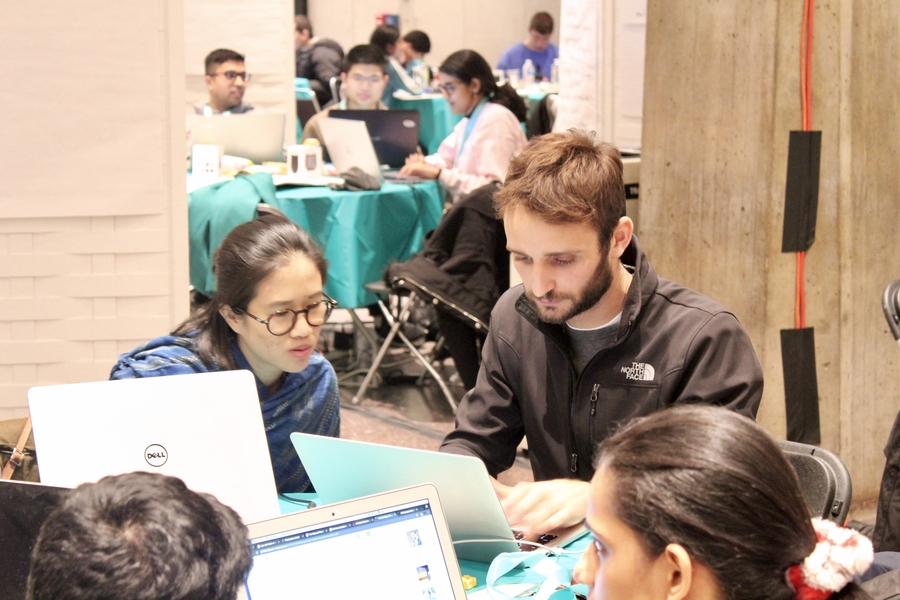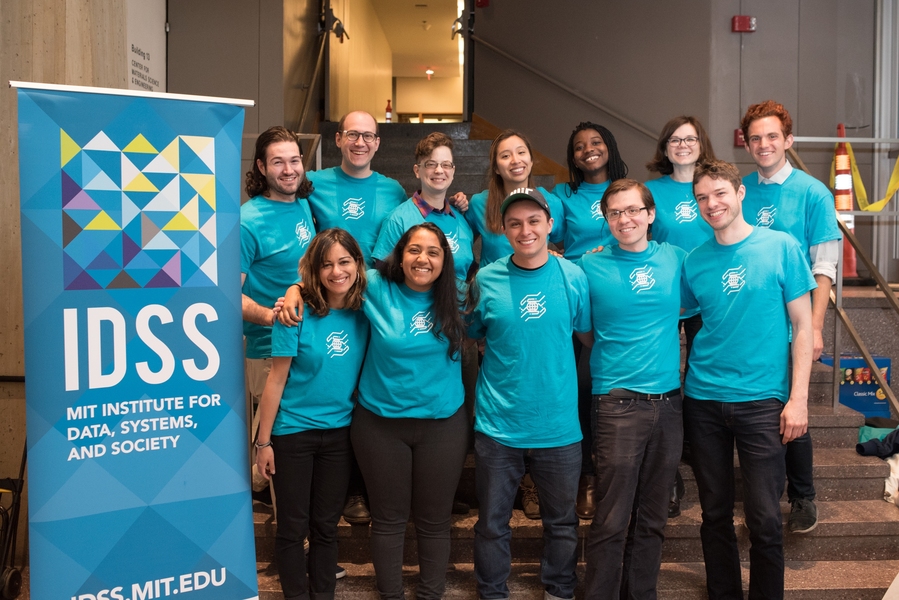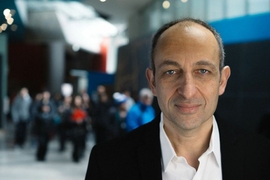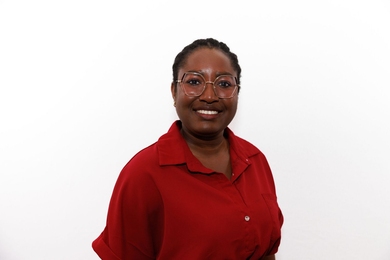100 researchers and students from MIT and six other universities gathered on campus this April for the first weekend-long MIT Policy Hackathon. This interdisciplinary event teamed data science, engineering, and policy students to explore solutions to real societal challenges submitted by sponsor organizations.
The hackathon, subtitled “Data to Decisions,” was organized and run by students from MIT’s Institute for Data, Systems, and Society (IDSS). Participants used datasets provided by nonprofit, education, and government institutions to pitch solutions to complex challenges in cybersecurity, health, energy and climate, transportation, and the future of work. A panel of judges evaluated the pitches and read final policy proposals.
“It’s a different type of hackathon in that it is focused on public policy outcomes,” says Amy Umaretiya, a student organizer with IDSS’s Master’s program in Technology and Policy (TPP). “We have these concrete challenges put forth by organizations that have data analytics needs for social good that aren’t being met.”
“We wanted to create a hackathon where interdisciplinary teams tackle complex societal problems,” explains Marco Miotti, a doctoral student at IDSS. “The challenges were structured so you can’t solve them without both data and policy expertise.”
Data and diaper need
The winning team, called NappyTime, worked on the health challenge with sponsors from Yale’s Mental health Outreach for MotherS (MOMS) Partnership and the National Diaper Bank Network (NDBN). The problem: lack of a sufficient supply of diapers to keep babies and toddlers clean, dry, and healthy. Diaper need affects one in three low- and middle-income families in the U.S., and can have a significant impact on the physical, mental, and economic well-being of both children and parents.
“The crux of this proposal was the need for more data on diaper need, and quantifying the benefits of addressing it,” says Lawrence Baker, a TPP student on the winning team. “We wanted to propose policies that would be inexpensive for Connecticut, easy to implement, and would allow the collection of more data.”
Lori Wallace, a postdoctoral associate with MOMS, mentored the challenge. She was joined by Lynn Comer of NDBN, who was also a judge. Both remarked on the applicability and ingenuity of the winning proposal, which is under a nondisclosure agreement. “By focusing on cost-effective means to embed the provision of diapers into our childcare system, the hackathon participants presented actionable solutions to this real life issue,” they said.
Hackathon judge Frank Field, a senior research engineer with IDSS who is associate director of TPP, was also impressed with the team’s proposal and presentation, both during their pitch and the follow-up Q&A session. Says Field: “Their proposal went right at the problem. It was pitched in the form of a staged implementation, which cleverly skirts some of the classic impediments to policy innovations by targeting some populations immediately while centering on issues whose resolution could inform and refine a wider deployment."
Real data, real problems
Two local challenges were sponsored by organizations within the Massachusetts government. The first, in transportation, looked for solutions to congestion on local highways and train lines. Transportation proposals considered the impact of autonomous vehicles and suggested ideas ranging from shielded bike paths to establishing a car-free area within Kendall Square.
Meanwhile, the energy and climate challenge asked teams to help Boston meet its goal of carbon neutrality by 2050. Climate hackers worked with green building data that had previously been locked up in PDF format. Hackathon organizers partnered with WattzOn, a software company working in utility data, to extract the information into a usable dataset.
“It was great that the problem was drawn from the real world, that we had real data, and that our mentors had working knowledge of relevant policies. It really showed us how to work through a policy problem with various administrative constraints, interfering regulations, and incomplete data,” says energy and climate hacker Zhen Dai, a PhD student researching the science and policy of solar geoengineering at Harvard University.
The cybersecurity challenge, sponsored by Boston University Law School’s Technology and Cyberlaw Clinic, called upon students to examine the multitude of legislative and policy approaches that U.S. states use to respond to cybersecurity breaches such as those experienced by Equifax and Yahoo. Teams were asked to consolidate and compare these approaches across states, and then propose ways to identify and implement some of the more effective policies.
“It’s important to have people who can think at the intersection of computer science and policy,” says Nathaniel Fruchter, a hackathon organizer and TPP student. “The breach dataset provided to the hackers has been largely unexplored by academia or industry, so we were really excited to see what new perspective these teams could bring.”
The future of work challenge came from the MIT Initiative on the Digital Economy and Wonolo, an online labor market focused on local blue collar jobs. Hackers used Wonolo’s job data to explore the design of policies for ensuring a social safety net for workers in the gig economy.
“It is very satisfying to use the skills we normally only apply to narrowly focused, high-level scientific problems in the lab instead on a broad range of social issues that impact the daily life of many community members,” says hacker Ryan Badman, a Cornell University PhD student in physics.
To student organizer Christoph Tries, the hackathon demonstrated the applicability of data science tools to addressing many complex societal challenges — making IDSS an ideal host for the event. “We are lucky to have IDSS at MIT. Other students are more siloed at their universities and don’t have that interdisciplinary focus. There are a lot of folks studying data science who are looking for ways to apply their knowledge to public policy and connect with people who actively need their help.”









